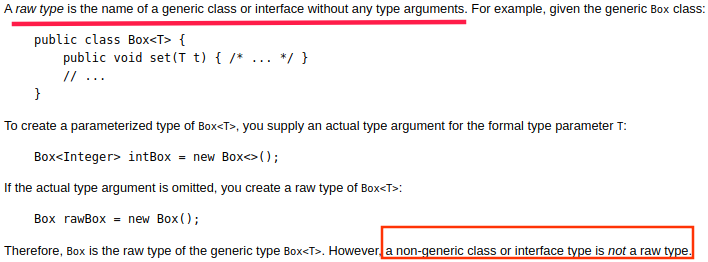Java泛型(1)基础部分、 Type Parameter、Type Argument、parameterized type 、raw type 等
1.官方文档
|
https://docs.oracle.com/javase/tutorial/java/generics/index.html |
|
https://docs.oracle.com/javase/tutorial/java/generics/types.html |
|
https://docs.oracle.com/javase/tutorial/java/generics/rawTypes.html https://docs.oracle.com/javase/specs/jls/se17/html/jls-4.html#jls-4.8 |
|
https://docs.oracle.com/javase/tutorial/java/generics/genTypeInference.html |
2.用泛型的好处
- Stronger type checks at compile time.
A Java compiler applies strong type checking to generic code and issues errors if the code violates type safety. Fixing compile-time errors is easier than fixing runtime errors, which can be difficult to find. - Elimination of casts.
The following code snippet without generics requires casting:When re-written to use generics, the code does not require casting:List list = new ArrayList(); list.add("hello"); String s = (String) list.get(0); List<String> list = new ArrayList<String>(); list.add("hello"); String s = list.get(0); // no cast - Enabling programmers to implement generic algorithms.
By using generics, programmers can implement generic algorithms that work on collections of different types, can be customized, and are type safe and easier to read.
3.泛型中的类型名词
3.1 Generic Type : 泛型类型
以通过参数传递类型形式定义的类或者接口,如下面的GenericClass和GenericInterface都是泛型类型。
interface GenericInterface<T,U,V> { } class GenericClass <T,U,V> { }
3.2 Type Parameter (Type Variable) : 类型形参(类型变量)
上述代码中的 T、U、V 就是类型形参,也叫类型变量。
以下类型可以作为类型形参:[ 类,接口,数组,其它类型变量 ] 。
类型形参的命名习惯(非强制)如下:
- E - Element (used extensively by the Java Collections Framework)
- K - Key
- N - Number
- T - Type
- V - Value
- S,U,V etc. - 2nd, 3rd, 4th types
3.3 Type Argument : 类型实参
传递给类型形参的实际参数就是类型实参。
- 在声明时 Foo<T> 中的T就是类型形参
- 在定义时 Foo<String> 中的 String 就是类型实参.
3.4 parameterized type : 参数化类型
类型 + <泛型形参> 组合 就是参数化类型,如:List<String> 。它可以作为泛型实参,如:
class A<T> { } //class B<N,A<N> > { } //error class C<P> { } class D<P extends A<P>> { } public class ParameterizedTypes { @Test public void main(){ A<Integer> ai = new A<>(); C<A<Float>> ca = new C<>(); } }
3.5 Raw Type : 泛型生类型
在java官方文档中,有两处关于 Raw Type的介绍:
第1处:
https://docs.oracle.com/javase/tutorial/java/generics/rawTypes.html

第2处:
https://docs.oracle.com/javase/specs/jls/se17/html/jls-4.html#jls-4.8

总结如下:
- 泛型类型在定义且未指定泛型实参时,这个类型就是raw type
- 数组类型对应的元素类型是raw type
- 非泛型类型不是Raw Type
示例:
class Ra <T>{ public void fun(T t){} } //只是个泛型类型声明 class Rb { public void fun( ){} } //只是个类声明 public class RawTypes { @Test public void testRawType(){ Ra<Integer> rai = new Ra<>(); //Ra<Integer> is parameterized type Ra ra = rai ; //Ra is a raw type of Ra<T> Ra<String> ras = new Ra() ; //warning,unchecked assignment,Ra is a raw type of Ra<T>, ra.fun("test") ; //warning,unchecked call } }
其中第9、10行产生警告,原因是编译器在执行泛型擦除的时候无法得到类型的确定信息,从而无法安全擦除。
可以使用-Xlint:-unchecked flag 和 @SuppressWarnings("unchecked") 关闭这个警告。
4.泛型函数
4.1 约定
- [ 构造函数、普通函数、静态函数 ] 可以使用泛型。
- 泛型形参的个数可为多个
- 泛型形参支持通配符类型
4.2 示例
class M1 { public <T> M1(T m) { System.out.println("M1::constructor") ; } public void foo() { System.out.println("M1::foo") ; } } public class Methods { public Methods() { System.out.println("constructor") ;} //public <T> Methods(T t) { System.out.println("con(" + t.getClass().getSimpleName() + ")") ;} public <K,V> void fun(K k,V v) { System.out.println("fun(" + k.getClass().getSimpleName() + ")") ;} public static <K> void foo(K k) { System.out.println("foo(" + k.getClass().getSimpleName() + ")") ;} //public <T> static void foo(){} //error ,<T>在 static后面,返回值前面。 @Test public void test_generic_method1(){ Methods obj = new Methods() ; //constructor obj.<Integer,Double>fun(1,2.0) ; //fun(Integer) obj.<Float,Byte>fun(1f, (byte) 0b1) ; //fun(Float) obj.fun("s","") ; //fun(String) obj.foo(1) ; //foo(Integer) Methods.<String>foo("ok") ; //foo(String) M1 m = new M1(3) ; //构造泛型函数 m.foo() ; } public <T extends Number> void f2(T t) {} public void f3(Collection<? super Number> t){} @Test public void test_generic_method2(){ Methods obj = new Methods() ; //constructor obj.<Integer>f2(1); obj.f2(3f); //obj.<String>f2("error"); //error obj.f3(new ArrayList<Object>()); //obj.f3(new ArrayList<Integer>()); //error } }
输出结果为:
constructor constructor fun(Integer) fun(Float) fun(String) foo(Integer) foo(String) M1::constructor M1::foo
4.3 泛型类的泛型构造函数
/** * 泛型类的构造函数为泛型 */ @Test public void test_generic_constructor1(){ class Vector <T> { Object mObject; <U> Vector(U u){ mObject = u; } } Object obj = new Vector<Integer>("hello"); Vector<Float> fv = new Vector<>("hi") ; Vector<Byte> vt = new Vector("yes") ; }
4.4 普通类的泛型构造函数
/** * 普通类的构造函数为泛型。 */ @Test public void test_generic_constructor2(){ class V2{ Object mObject; <U> V2(U u){ mObject = u; } } //Object obj2 = new V2<String>("1") ; V2 fv2 = new V2(33f) ; V2 vt2 = new V2("yes") ; }



【推荐】国内首个AI IDE,深度理解中文开发场景,立即下载体验Trae
【推荐】编程新体验,更懂你的AI,立即体验豆包MarsCode编程助手
【推荐】抖音旗下AI助手豆包,你的智能百科全书,全免费不限次数
【推荐】轻量又高性能的 SSH 工具 IShell:AI 加持,快人一步
· go语言实现终端里的倒计时
· 如何编写易于单元测试的代码
· 10年+ .NET Coder 心语,封装的思维:从隐藏、稳定开始理解其本质意义
· .NET Core 中如何实现缓存的预热?
· 从 HTTP 原因短语缺失研究 HTTP/2 和 HTTP/3 的设计差异
· 分享一个免费、快速、无限量使用的满血 DeepSeek R1 模型,支持深度思考和联网搜索!
· 基于 Docker 搭建 FRP 内网穿透开源项目(很简单哒)
· ollama系列1:轻松3步本地部署deepseek,普通电脑可用
· 按钮权限的设计及实现
· 【杂谈】分布式事务——高大上的无用知识?